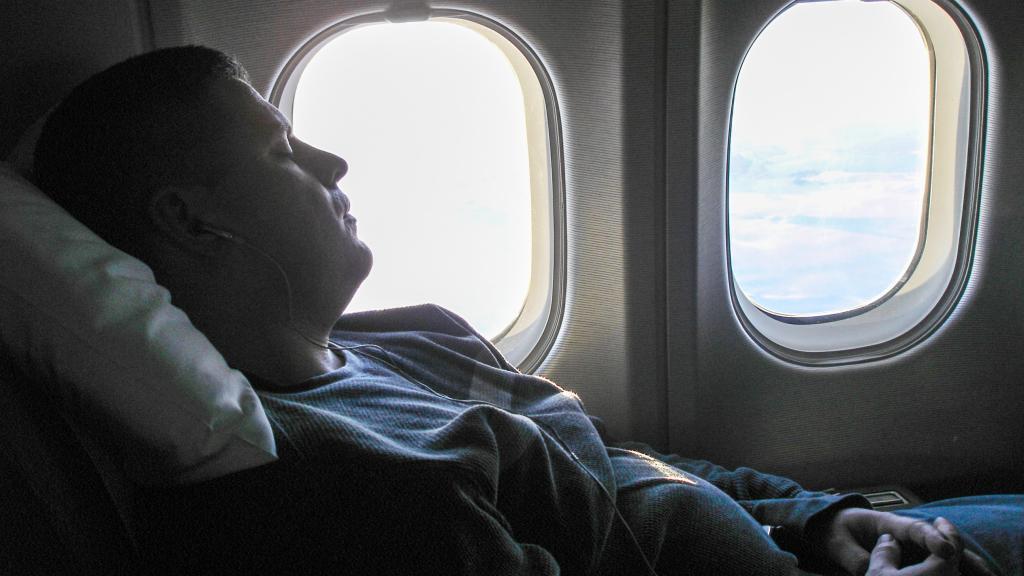Inconvenience and discomfort are well-known drawbacks of long-distance air travel. Extended aircraft travels can be exhausting for many individuals, due to the logistics of check-in, the stress of security lines, and the hours of sitting in the same place for so long.
Long-haul trips can be physically taxing because of the effects of jet lag. Jet lag is the result of your body’s internal clock being out of sync with the time zone that you’re traveling to. When flying over three or more time zones, this behavior is common.
It is possible to suffer from jet lag symptoms for days or even weeks following a long travel. For both work and pleasure, jet lag can have a severe impact.
Long-distance travel can be made more bearable and less detrimental to one’s health and well-being if one is aware of the symptoms, causes, and remedies for jet lag.
What Is Jet Lag?
When your 24-hour internal clock, known as your circadian rhythm, does not match the local day-night cycle, you get jet lag.
circadian rhythm is normally aligned with daylight, encouraging alertness and sleep at night in normal circumstances. In order to get a good night’s sleep and maintain good physical and mental health, this internal clock is set to match the 24-hour day. Because dawn and sunset occur at different times around the world, a person’s geographic location has an impact on their circadian rhythm.
People who travel across three or more time zones are more likely to suffer from jet lag than those who only cross one or two. Even if you arrive in New York at 8 p.m. after flying from Los Angeles, your body may still think it’s 5 p.m. in L.A. As a result of jet lag, you may have symptoms like as staying up later than you’d prefer, sleeping at unusual times, or simply feeling exhausted.
What Are the Symptoms of Jet Lag?
When you’re jet-lagged, you’ll experience the following:
- Sleeping problems: It’s possible that you’ll have trouble falling asleep or that you’ll wake up earlier than expected. As a result of jet lag, your sleep may be disrupted.
- Daytime sleepiness: You may have daytime sleepiness as a result of jet lag.
- Impaired thinking: You may have difficulty paying attention or remembering things, or you may just feel like your brain is sluggish.
- Hampered physical function: Traveling as an athlete can put a strain on your body’s energy levels and limit your ability to perform at your best.
- Emotional difficulties: Jet lag can make people irritable, and it has been linked to an increased risk of mental health issues like depression and bipolar disorder.
- General malaise: Malaise, a general sense of discomfort, illness, or uneasiness, may occur as a result of jet lag.
- Stomach problems: Gastrointestinal issues such as decreased appetite and nausea can result from jet lag, which can also lead to constipation and IBS.
- Sleep paralysis and seizures: Jet lag can have an effect on sleep architecture, increasing the risk of sleep paralysis and midnight seizures in rare cases.
The disruption of your circadian rhythm affects how and when your body generates hormones that regulate sleep and other biological processes, which is why these symptoms occur after long journeys to other time zones.
One or more of the signs and symptoms listed above are present in people who are suffering from jet lag. A few days after arriving, symptoms may begin to appear. For many, the first night after a flight is spent soundly only to be followed by nights of restless sleep.
Depending on how far you go, jet lag might continue for a few days or even weeks. One to 1.5 days per time zone crossed is the norm, but the length of symptoms varies from person to person and from trip to vacation.
Can Jet Lag Have Long-Term Consequences?
The body’s circadian rhythm adjusts to the local time, thus jet lag is usually only a temporary inconvenience. Pilots, flight attendants, and business travelers who travel long distances on a regular basis may develop a chronic case of jet lag.
Chronic insomnia can be caused by a circadian rhythm that is constantly out of whack. Chronic circadian rhythm disruption may increase the risk of diseases like diabetes and depression, as well as certain types of cancer, if your body’s internal clock is out of whack.
What Causes Jet Lag?
Jet lag occurs when a traveler travels three or more time zones. As additional time zones are traversed, the symptoms may become more apparent.
Jet lag is more severe when going east than west, according to the vast majority of people. Because it’s easier to delay your internal clock than advance it, jet lag varies depending on the direction of travel. North-south flights that don’t travel through many time zones don’t cause jet lag.

Long-distance travelers aren’t all affected by jet lag. Jet lag can be caused by a variety of circumstances, including:
- Trip details: There are many variables that can effect jet lag, including the total distance traveled, number of layovers, time zones crossed, and direction of travel.
- Arrival time: Your circadian rhythm may be disrupted when you arrive at your location. There is some evidence that arriving in the afternoon reduces jet lag compared to arriving in the early morning.
- Age: Jet lag may be influenced by a person’s age, however studies have yielded inconsistent results. Research on pilots indicated that jet lag was worse in younger persons than in those over 60, but this is not always true.
- Sleep before travel: People who don’t get enough sleep the night before their flight are more likely to experience jet lag when they arrive at their destination.
- Stress: Stress can keep your body and mind on edge, making it difficult to sleep and harder to adjust to jet lag.
- Use of alcohol and caffeine: During flights, many people consume wine and coffee, both of which have a direct impact on the brain’s ability to sleep.
- Past history of jet lag: It is more common for people who have had jet lag in the past to suffer from it again.
- Individual variation: Because of unknown reasons, some persons are more likely than others to suffer from circadian rhythm disturbances on long-distance flights.
The number of variables makes it difficult to predict who will experience jet lag, how bad it will be, and how long it will continue. However, mild jet lag is normal when more than three time zones are traversed when flying.
How is Jet Lag Different From Travel Fatigue?
After a long day of travel, it’s normal to feel exhausted. While it’s easy to mistake this for jet lag, more often than not it’s the result of exhaustion brought on by long periods of travel. Because of the physical exertion of travel, symptoms including exhaustion and headaches can occur.
Passengers in airplane cabins can get dehydrated and more vulnerable to respiratory issues because of the cabin’s chilly, dry, low-pressure air. Long periods of sitting can produce leg swelling as a result of changes in air pressure. It might be tough to get a good night’s sleep while traveling because of the difficulties of sleeping upright in an airplane seat, especially when the flight attendants are constantly interrupting your slumber.
Although exhaustion is common after a long travel, it is not the same as jet lag.
Travel tiredness does not impair circadian rhythms, unlike jet lag, which does. Therefore, while jet lag normally goes away after a full night’s sleep, travel tiredness might last for days or weeks until one’s internal clock is adjusted.
After a long-distance flight, it is possible to have both travel tiredness and jet lag; however, jet lag is significantly more likely to induce long-term and severe symptoms.
How can I prevent jet lag?
Unfortunately, there is no way to guarantee that you will not experience jet lag as a result of your trip. However, there are a number of things you may do to lessen the effects of jet lag.
Start preparing for schedule changes before you travel
Slowly alter your eating habits in the days leading up to your vacation to coincide with the times you’ll be dining at your destination.
For a few days before to your departure, try to sleep and wake up later if you’re moving from east to west. Prepare your body for a change in sleep habits by setting your alarm clock earlier and waking up earlier if you’re traveling east to west.
Move your body on the plane
In order to avoid jet lag, you should try to stay active on a plane. On long flights, if you can, try to get up and walk around the cabin.
While seated, you can also perform a variety of workouts. Try:
- I’m taking a deep breath in.
- The act of stomping one’s feet.
- Getting on your hands and knees.
- Making a 180-degree turn.
- Overhead swivels of the arms
- Tensing and releasing the muscles in your legs.
When will jet lag go away?
The length of jet lag depends on a variety of factors. How far you travelled, the specific cycles of your body, and your overall health are all factors to consider. A few days after arriving at their destination, many travelers who have been suffering from jet lag report feeling better. It can take up to a week for some people to feel completely normal again.

When should I call the doctor?
Symptoms of jet lag that persist or worsen for more than a week following travel should be reported to your doctor.
If you notice any symptoms that aren’t likely to be caused by jet lag, you should contact your healthcare professional.
- Fever.
- Vomiting or nausea.
- Cough.
- My throat hurts.
- Other flu or coronavirus symptoms.
A note from Cleveland Clinic
The effects of jet lag are frequent. Long-distance flights (with more than two time zone changes) by plane can provide this experience to people of any age. A new sleep-wake cycle may cause minor to significant sleep problems or other symptoms for you. When traveling, it is possible to avoid experiencing jet lag symptoms. Jet lag can be minimized by preparing your body for regular shifts and making good food choices during your vacation.


![Top Rated CPAP Machine Buyer’s Guide [current_date format=’m/Y’]](https://bestpillowsleepers.com/wp-content/uploads/2023/03/best-cpap-machine-img_6405d72310053-400x300.jpg)
![The 11 Best Cooling Weighted Blankets [current_date format=’m/Y’]](https://bestpillowsleepers.com/wp-content/uploads/2023/01/best-cooling-weighted-blankets-img_63d4ff15c615d-400x300.jpg)
![Ultimate Guide to Choosing a Best Cooling Mattress Pads [current_date format=’m/Y’]](https://bestpillowsleepers.com/wp-content/uploads/2023/01/best-cooling-mattress-pads-img_63c403115126b-400x300.jpg)
![Ultimate Guide to Choosing a Best Cooling Mattress [current_date format=’m/Y’]](https://bestpillowsleepers.com/wp-content/uploads/2023/01/ultimate-guide-to-choosing-a-best-cooling-mattress-img_63bcdba870d77-400x300.jpg)
![Ultimate Guide to Choosing a Best Cooling Comforters [current_date format=’m/Y’]](https://bestpillowsleepers.com/wp-content/uploads/2023/01/ultimate-guide-to-choosing-a-best-cooling-comforters-img_63bba2f5cd3ce-400x300.jpg)